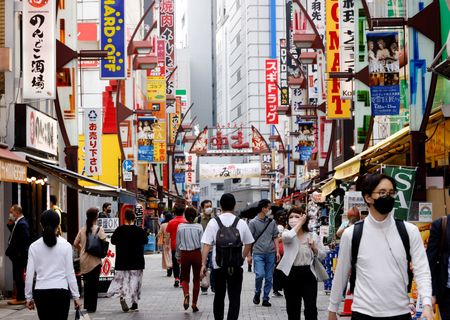By Leika Kihara and Yoshifumi Takemoto
TOKYO (Reuters) – Core consumer prices in Japan’s capital, a leading indicator of nationwide trends, rose a faster-than-expected 4.0% in December from a year earlier, exceeding the central bank’s 2% target for a seventh straight month in a sign of broadening inflationary pressure.
The increase, which was the fastest pace in four decades, will likely underpin market expectations the Bank of Japan (BOJ) may phase out its massive stimulus by tweaking its yield curve control policy.
“It’s clear Japan’s inflation is perking up as a trend. The economy’s output gap will also likely to turn positive soon,” said Mari Iwashita, chief market economist at Daiwa Securities.
“All in all, we’re seeing more data that will give the BOJ reason to eventually normalise monetary policy,” she said.
The rise in the Tokyo core consumer price index (CPI), which excludes fresh food but includes fuel, exceeded a median market forecast of 3.8% and a 3.6% gain seen in November, government data showed on Tuesday.
Tokyo core CPI at a new 40-year high https://www.reuters.com/graphics/JAPAN-ECONOMY/INFLATION/movakjnrrva/chart.png
The last time Tokyo inflation was faster was April 1982, when the core CPI was 4.2% higher than a year before.
The Tokyo core-core CPI index, which excludes fuel as well as fresh food, was 2.7% higher in December than a year earlier, picking up from the 2.5% annual gain seen in November.
The rise in the Tokyo CPI heightens the chance that nationwide consumer inflation likely stayed above the BOJ’s 2% target in December.
The BOJ will likely upgrade its inflation forecasts at a rate review next week, sources have told Reuters, underscoring its conviction that robust domestic demand will keep inflation sustainably around its 2% target in coming years.
BOJ Governor Haruhiko Kuroda has dismissed the chance of a near-term interest rate hike on the view the bank must keep supporting the economy until the current cost-push inflation turns into a demand-driven one accompanied by higher wages.
But Japan’s long-term interest rates have crept up since the BOJ stunned markets last month by widening the band around its 10-year bond yield target, a move that investors saw as a prelude to a future rate hike.
The central bank’s heavy-handed market intervention has failed to correct distortions in the yield curve, analysts say, underscoring the challenge it faces in mitigating the rising cost of prolonged easing.
There is also uncertainty on whether Japanese companies will increase wages enough to cushion the blow to households from rising living costs.
Household spending in November unexpectedly fell 1.2% from a year earlier, separate government data showed on Tuesday, marking the first drop in six months in a sign of the fragility of private consumption.
(Reporting by Leika Kihara and Yoshifumi Takemoto; Additional reporting by Kantaro Komiya; Editing by Lincoln Feast and Bradley Perrett)

